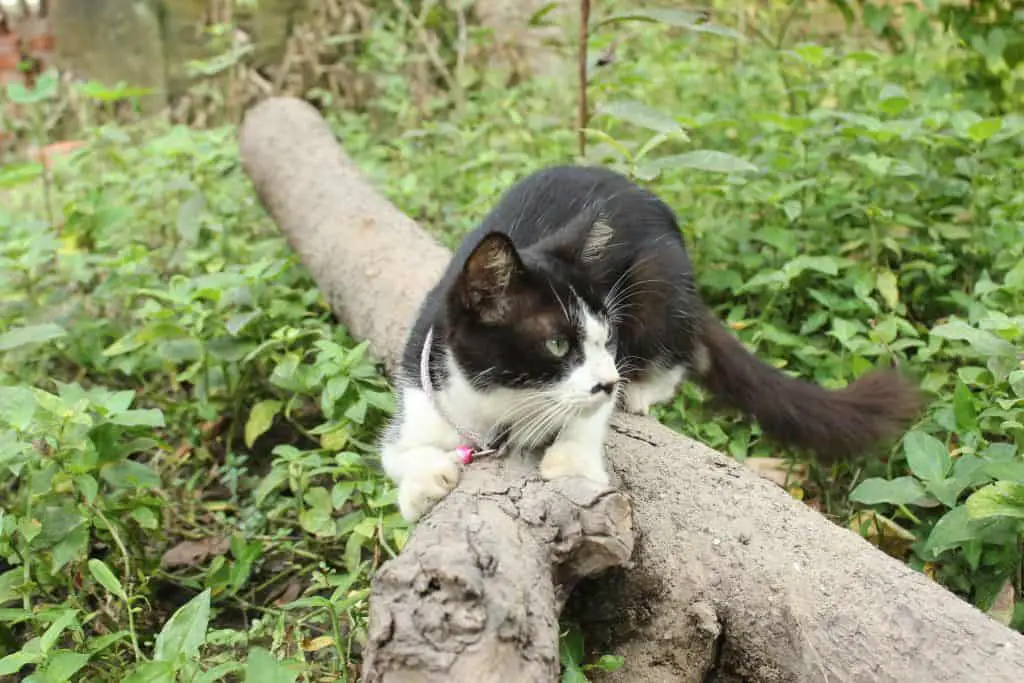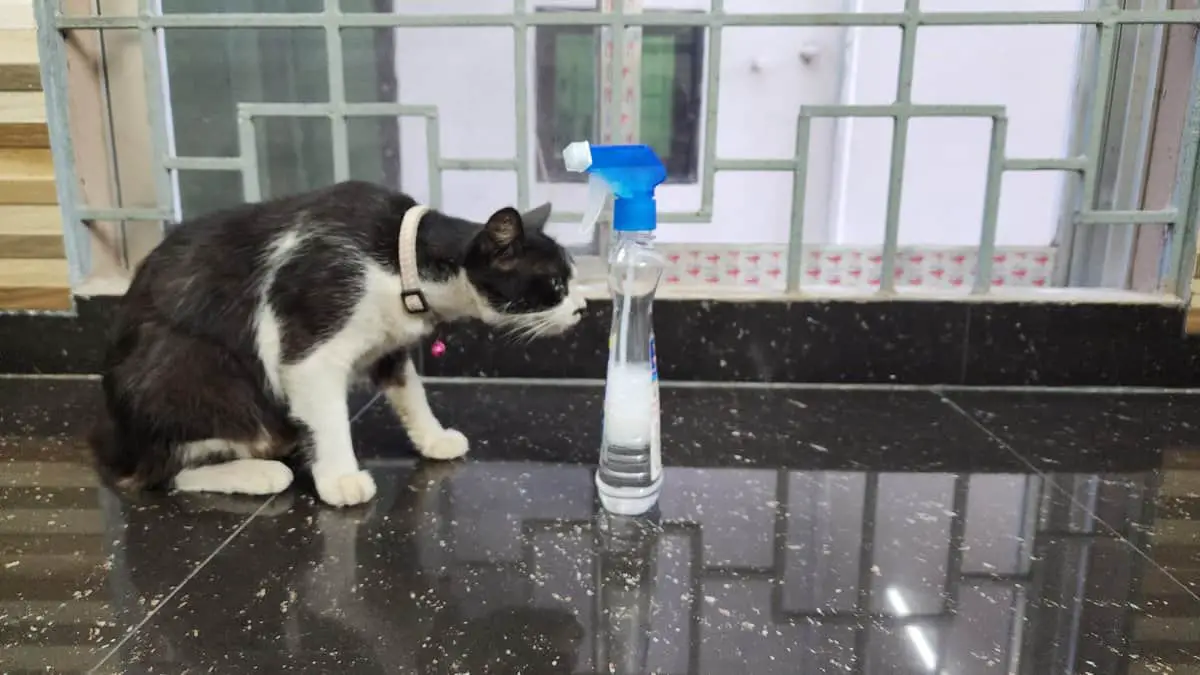Spiders are fascinating creatures, with around 50,000 different species found around the world. Some of these spiders are venomous and dangerous to both mankind and pets, including cats. Using non-toxic spider repellents at home is crucial to keep your pets safe.
There are many natural spider repellents safe for cats that you can use to protect your pets. Spiders don’t like the smell of citrus and some essential natural oils. You can use citrus peels, peppermint oil, vinegar, etc., to repel spiders naturally. Many artificial spider repellents are also available in the market.
However, you should be careful to use ingredients that are safe for your cats. Some essential oils can irritate cats. I suggest knowing the side effects before using spider repellents!
What Are Some Natural Spider Repellents Safe for Cats?
When looking for natural spider repellents safe for cats, it’s essential to choose options that are non-toxic and do not contain harmful chemicals.
Here are some repellents I use against spiders that are safe for my cat, Muezza.
Peppermint Oil
Peppermint has a powerful aroma that repels spiders. Therefore, it works well. Apply a few drops of water-diluted pure peppermint essential oil around windows, doors, and other potential access points.
The scent of peppermint is typically not irritating or unpleasant to Muezza in moderate amounts.
Vinegar
White vinegar is a great natural spider repellent that is safe for cats.
Mix equal parts of water and white vinegar in a spray bottle and apply it to areas where spiders tend to appear. The areas where spiders can appear include corners, windowsills, and doorways.
Citrus Peels
Spiders have an aversion to citrus scents, making citrus peels an effective natural repellent.
I put orange, lemon, or lime peels close to spider-prone areas to prevent them from entering. In general, citrus odors don’t bother cats.
Cedarwood
Spiders detest the natural properties of cedarwood. Where spiders are an issue, use cat-safe cedarwood essential oil or cedar blocks. Muezza typically copes well with cedarwood odor.
Eucalyptus Oil
Eucalyptus oil is another smell that repels spiders, much like peppermint. Use water and eucalyptus essential oil as a spray to ward off spiders. Use it only in locations that your cats cannot get.
Lavender Oil
Spiders are repelled by the fragrant scent of lavender. I spray a few drops of water-diluted lavender essential oil in spider-prone locations. Lavender tends to be relaxing and non-irritating to cats.
Chestnuts
Scattering chestnuts around your house will ward off spiders.
Chestnuts are a cat-safe alternative for spider control because spiders don’t like the natural substances they contain. Use these natural repellents wisely and only in places where your cats cannot come into direct touch with them.
I always watch how Muezza responds to these scents as well to make sure she doesn’t have any negative effects.
Can You Use Commercial Spider Repellents?
If you can’t find natural ingredients, you can also rely on the spider repellents available in the market. I use TERRO T2302-6 Spider Spray, which is an effective spray that serves this purpose without harming Muezza.
Read the product labels carefully to be sure they are safe to use around cats and other pets before using any commercial spider repellent.
Apply the product according to the manufacturer’s directions. Avoid using too much of it in locations where your cats are likely to wander.
You can also use Ultrasonic Spider Repellent, which impacts the neurological auditory of pets and keeps them away.
Watch your cat’s behavior and responses to the repellent. If you notice any signs of discomfort, discontinue use immediately and consult with your veterinarian for further guidance.
Can Spiders Be Harmful for Cats?
In general, most species of spiders found in homes are not venomous enough to cause serious harm to cats.
Nevertheless, some species, like the black widow or brown recluse, can deliver bites that may lead to discomfort, allergic reactions, or infections in cats.
Cats could also unintentionally chase and try to catch spiders, which could lead to bites or stings.
Spider Bites
Cats are naturally curious animals, and they may try to catch or play with spiders. They might get bitten in the process.
Most spider bites cause minimal bruising and swelling. Cats who have been bitten by a spider may have regional pain, redness, swelling, and possible allergic reactions.
Although encounters with highly venomous spiders are relatively rare in homes, it is still crucial to be aware of their presence. Two deadly spiders that can be found in some areas are the black widow and the brown recluse.
You can recognize the black widow by a unique red hourglass-shaped mark on its abdomen. At the same time, the brown recluse has a violin-shaped marking on its cephalothorax.
These spider bites may severely damage cats’ health and need quick veterinary care.
Allergic Reactions
Some cats may be more allergic to even less dangerous spider bites than others, making them more vulnerable to venom.
Depending on the particular cat’s sensitivity and the venom of the particular spider, these reactions might range from minor discomfort to more serious systemic responses.
Keep an eye out for any unusual behavior of your cat, and contact a vet if needed.
Secondary Dangers
When a cat attempts to catch or play with a spider and is bitten or hurt, the wound might become an entry route for germs. This can result in secondary infections.
Some cats may experience stress and anxiety due to spiders in the home. They may become irritated or show changes in behavior because of fear or discomfort, affecting their overall well-being.
What Are the Preventive Measures You Can Take to Protect Your Cat From Spiders?
To reduce the number of spiders in your home and provide a secure and cozy environment for your cats, preventative measures are crucial.
Regular home maintenance and cat-safe pest control methods can help mitigate any risks associated with spiders and keep your cats healthy. You can consult with a veterinarian to know more about the safety measures.
Here are some specific steps I follow for Muezza’s well-being –
Regular Cleaning
Keep your house tidy and clutter-free. Dust and vacuum frequently to get rid of spider webs and probable spider hiding places.
I pay attention to areas such as window sills, corners, and other places where spiders frequently construct their webs.
Keep the area around your home clear of outside garbage, such as leaves, woodpiles, and junk, in the garden. Because these can be spiders’ preferred hiding places.
Seal Gaps and Cracks
To keep spiders out of your house, check your windows, doors, walls, and foundation for any gaps or cracks and seal them.
I use caulk and weather stripping to seal gaps effectively.
Monitor Cat’s Outdoor Activities
If your cats spend time outside, keep an eye on their activities.

I make sure to be careful when letting Muezza explore new locations to lower the possibility of encounters with spiders or other outdoor dangers.
Use Screens
Put screens on windows and doors to let fresh air in while keeping spiders and other insects outside.
Appropriate Lighting
Light draws spiders, which in turn draw the other insects they feed on.
For outdoor lighting, I use yellow or sodium vapor lights since they are less attractive to insects and, hence, have fewer spiders.
Cat-friendly Pest Control Services
If you decide to hire pest control experts, choose cat-friendly techniques that avoid using toxic chemicals harmful to animals. Consult a pest control expert with knowledge of pet-friendly procedures.
By implementing these preventive measures, you can create a spider-resistant environment that keeps your home comfortable and safe for your cats.
FAQs
People are often unsure about how to repel spiders without harming their pets. Here, I’ve answered the most asked questions regarding spider repellents safe for cats –
Q. What should I do if my cat comes into contact with spider repellent?
If your cat comes into contact with spider repellent, immediately wash the affected area with mild soap and water. For any adverse reactions, such as skin irritation or respiratory distress, contact your veterinarian.
Q. How do I use spider repellent around my cats?
When applying spider repellent, make sure to keep your cats away from the treated areas until the product has dried. This prevents them from coming into direct contact with the repellent.
Q. Can natural spider repellents harm cats?
Some essential oils, like peppermint oil, can irritate cats if they smell it directly.
The Bottom Line
Although most spiders found in homes are harmless, some venomous species can severely harm cats and other pets. Spiders can also be the reason for stress and anxiety for cats. So, it’s important to know how to keep spiders away from your cats.
You can find many spider repellents safe for cats – both natural and artificial. Essential oils like peppermint oil, lavender oil, eucalyptus oil, etc can help. Citrus peels, cedarwood, and chestnuts can also be your choice.
However, before purchasing an artificial repellent, consult with a vet and research the ingredients!


Leave a Reply